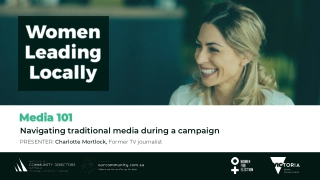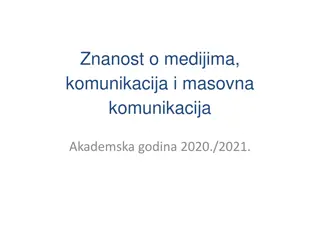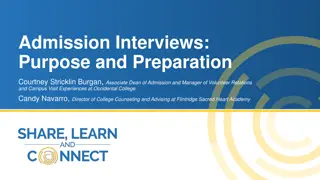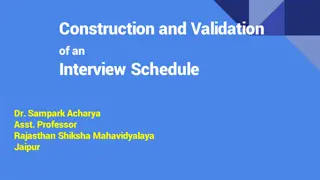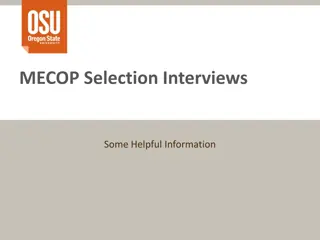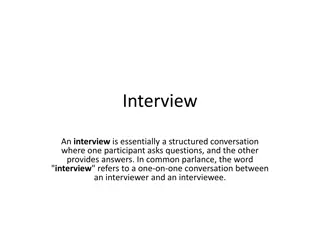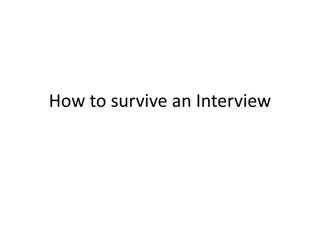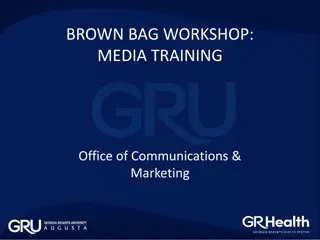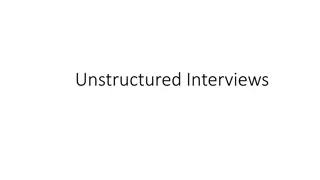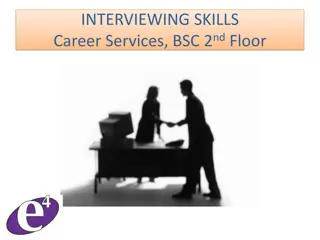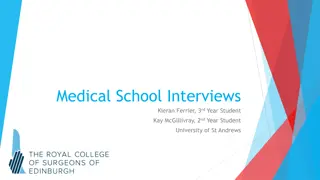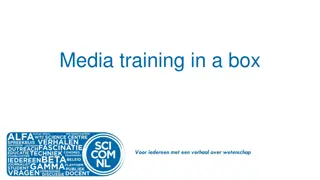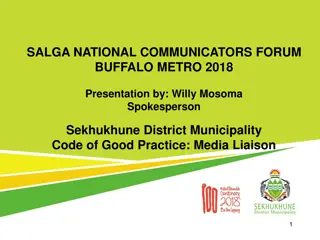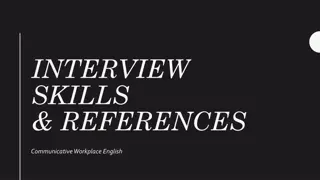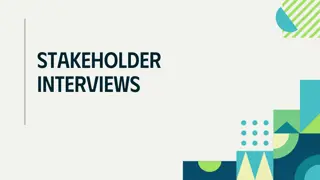Mastering Media Training: Tips for Successful Interviews
Enhance your media training skills with key strategies like conducting thorough research, preparing key messages, controlling interview flow, and handling challenging questions effectively. Learn how to communicate confidently, influence your audience, and build a strong brand presence through various media channels.
Download Presentation

Please find below an Image/Link to download the presentation.
The content on the website is provided AS IS for your information and personal use only. It may not be sold, licensed, or shared on other websites without obtaining consent from the author. Download presentation by click this link. If you encounter any issues during the download, it is possible that the publisher has removed the file from their server.
E N D
Presentation Transcript
WHY DO AN INTERVIEW Communicate with an audience Influence that audience Receive coverage Build your brand Build WCL brand .
DO YOUR HOMEWORK (I m here to help) What we can do in advance: 1) Know who you are speaking to Find out: The journalist s name/publication Focus of the interview Questions or types of questions (not all journalists will give you these but some will send them in advance) Type of story/angle Others in the piece (if applicable) Type of publication (video, audio, written, web, TV, radio, podcast etc.) Is the interview live or recorded?
DO YOUR HOMEWORK (I m here to help) What we can do in advance: 2) Being prepared Have answers ready for obvious questions Practice those questions and answers with teammates, family or in front of a mirror Be prepared for hostile questions Develop key messages (these are your fallbacks. If there is a question you do not want to answer, it is better to control the interview with a key message and bring it back on course)
KEY MESSAGES It is always good to have two or three key messages planed These can be the things you want to come across in an interview Less is more, keep these short and sweet so they can stand on their own. Use examples (where available) Examples of Key Messages: Feelings about competing at event/representing country Personal or team success How you overcame a challenge Motivations or inspirations Goals
KEY MESSAGES Example of a personal key message: I am working towards Olympic qualification We can bring it back to this key message whether it is a positive or negative question. You won a tournament: This is a stepping stone towards my goal of qualifying for the Olympics. You lose in the first round: While today is a disappointment, it won t deter me from my goal of qualifying for the Olympics, I will get back in the gym and fix my mistakes.
CONTROLLING THE INTERVIEW Key messages help to control the interview but there are other ways to do it. Bridge- answer questions directly, but bring them back to the things you want to talk about. Don t speculate, a journalist may ask you something you don t have an answer to, address why you can t answer, then bridge back to you. (ex. Justina at Commonwealth mixed zone) If you do not want to answer a question, you don t have to but don t just say no comment then people assume the worst. Say why you are not in position to comment, then bring it back to your comfort area. A way to deflect an unfair question: What I can say is Be honest, but don t volunteer unnecessary information. Never say This is off the record and then comment, a journalist can still use that. Some use different techniques than others. Remember despite your relationship, they have a job to do.
HOSTILE OR NEGATIVE QUESTIONS Depending where you are or where the journalist is from, you may get hostile or unfair questions. Journalist do this to create a headline. The important thing is to remain calm and not let it throw you off. Having those stock key messages ready will allow you to pivot. Do not focus on the negative.
TIPS AND TRICKS Handling nerves: Remember that you are the expert on what is being asked. Don t rush, take time to breathe. A long pause seems much longer in your head than it actually is. Be relaxed and yourself but try to stay serious. Be careful with jokes, as they can be misinterpreted. Remember doing an interview after a loss is difficult, but if you give the journalists time during your lows, they will be there for you highs.
SOCIAL MEDIA Things on social can be used by journalists Ask yourself before you post if you would be ok with something you post being in a news story If you wouldn t say it to a close friend or coach, parent, grand parent, you probably don t want to say it to a journalist, or post it. Always re-read and reflect on something before hitting post, do you want this attributed to you in five years? Be mindful of your content. Be respectful, don t use expletives, dishonest or defamatory statements or share sensitive information.


